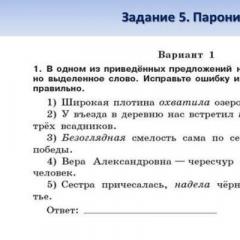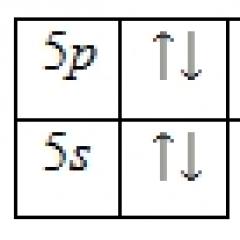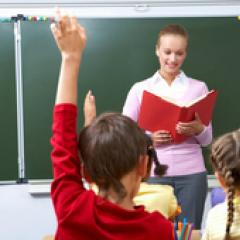Presentation of the study of professional competencies of teachers. Presentation "formation of professional competencies of a teacher as a tool for improving the quality of education." Draft decision of the teachers' council
« Formation of professional competencies of a teacher as a tool for improving the quality of education"
Prepared by: Ashikhmina Svetlana Anatolyevna, teacher of biology and chemistry
MKOU "Prigorodnoye Secondary School"
2017


What changed in the work of a teacher with the introduction of the Federal State Educational Standard?
- SOCIAL AND PSYCHOLOGICAL COMPETENCE
- PROFESSIONAL AND COMMUNICATIVE COMPETENCE
- GENERAL PEDAGOGICAL PROFESSIONAL COMPETENCE
- SUBJECT COMPETENCE
- MANAGEMENT COMPETENCE
- REFLECTIVE COMPETENCE
- INFORMATION AND COMMUNICATION COMPETENCE
- COMPETENCE IN THE FIELD OF INNOVATION ACTIVITY
- CREATIVE COMPETENCE

The teacher must understand that:
- 1. You need to be prepared for constant change.
- 2. It is impossible to build today’s and tomorrow’s behavior on the basis of yesterday’s knowledge and yesterday’s experience.
- 3. The main task is to ensure maximum success and minimum failure in the future lives of their students, therefore parents are the teacher’s most faithful allies.
- 4. Any human activity is beautiful and effective, and this idea should be conveyed to students.

The teacher must beware:
- Out of habit, consider yourself the most important and only source of knowledge.
- Pass on your life experience to your students and educate them based on how you yourself were raised.


Mechanisms for organizing the activities of teachers aimed at developing professional competence
Stage 1.
Identification of the level of professional competence of the teacher.
- diagnostics;
- testing.

Stage 2.
Mechanisms for developing professional competence of a teacher.
- training in advanced training courses;
- work in school education, creative groups, pedagogical workshops, master classes, subject decades;
- active participation in teacher councils, seminars, conferences;
- participation in various competitions;
- participation in research work, creation of own publications;
- generalization and dissemination of experience;
- certification;
- creative report;
- use of modern methods, forms, types, teaching aids and new technologies;
- self-education

Stage 3 .
Analysis of teacher activity.
To use presentation previews, create a Google account and log in to it: https://accounts.google.com
Slide captions:
Professional competence of teachers in the context of the implementation of the Federal State Educational Standard for Education © Senchenko I.V.
“Properly organized education leads to development” L.S. Vygotsky COMPETENT - knowledgeable, authoritative in any field. Dictionary by S.I. Ozhegov
Regulatory documents Federal Law “On Education in the Russian Federation” (dated December 29, 2012 No. 273-FZ); Federal State Educational Standard for Preschool Education (Rule of the Ministry of Education and Science of the Russian Federation dated October 17, 2013, No. 1155); Professional standard of a teacher (educator, teacher) (Rule of the Ministry of Labor and Social Protection of the Russian Federation dated October 18, 2013 No. 544n)
According to outstanding teachers of our time, there are several types of competence: Special competence Social competence Personal competence Methodological competence Psychological and pedagogical competence
The urgent task of the kindergarten is to create conditions in which for any child, regardless of his state of health or learning abilities, education will be of high quality and accessible. Inclusive education (French inclusif - including, Latin include - I conclude, include) is a process of development of general education, which implies the availability of education for everyone, which ensures access to education for children with special needs. The creation of such conditions is possible if teachers know the peculiarities of teaching and raising different categories of children with disabilities and are able to involve parents in the educational process.
Communicative competence is the ability to establish and maintain effective contacts with other people in the presence of internal resources (knowledge and skills). Criteria for communicative competence: The desire to understand another person in the context of the requirements of a specific situation; Express your thoughts clearly and convincingly; Create an atmosphere of cooperation; Willingness to be flexible in communication; Ability to communicate effectively in different status and role positions; Ability to create a favorable climate in a team.
Emotional competence is the ability to recognize and recognize one's own feelings, as well as the feelings of others, to motivate oneself, to manage one's emotions within oneself and in relationships with others. “Anyone can get angry – it’s easy. But being angry with the right person, to the right degree, at the right time, for a certain purpose and in an appropriate way - that is the difficulty.” Aristotle Emotional competence is an important condition for maintaining and promoting health.
Emotional competence contributes to the preservation and promotion of health, thanks to its key competencies: Recognizing and understanding one’s own emotions and feelings; Managing your emotions; Recognizing and understanding the feelings of others; Managing the feelings of others.
Professional standard of a teacher A document that includes a list of professional and personal requirements for a teacher, valid throughout the Russian Federation (approved by order of the Ministry of Labor and Social Protection of the Russian Federation dated October 18, 2013 No. 544n) The professional standard is designed to increase the motivation of teaching staff to work and the quality of education .
ICT competence of the teacher: 1. Selection of illustrative material for classes and for the design of stands, groups, classrooms (scanning, Internet, printer, presentation). 2. Selection of additional educational material for classes, familiarization with scenarios for holidays and other events. 3. Exchange of experience, acquaintance with periodicals, the developments of other teachers in Russia and abroad. 4. Preparation of group documentation and reports. 5. Creating presentations in the Power Point program.
Conditions for professional growth of a teacher: Reading methodological and pedagogical literature; Attending seminars, conferences; Conducting open sessions for analysis by colleagues; Study of information and computer technologies; Participation in master classes, competitions, including online competitions, etc.; Generalization of teaching experience; Systematic completion of advanced training courses (according to No. 273-FZ “On Education in the Russian Federation” at least once every three years).
Thus, the professional competence of a teacher depends on various personality traits. It is the increase in the competence and professionalism of the teacher that is a necessary condition for improving the quality of both the pedagogical process and the quality of preschool education in general. “How childhood passed, who led the child by the hand during childhood, what entered his mind and heart from the world around him - this decisively determines what kind of person today’s child will become.” V.A. Sukhomlinsky
Create, develop! Just as there are no children without imagination, there is no teacher without creative impulses! I wish you creative success! Thank you for your attention!
Berezhkova O.V. The problem of standardizing the professional activity of a preschool teacher. – Department No. 9, Sfera shopping center, 2013. Karelina E.V. Formation of communicative competence of educators. – Department No. 5, Sphere shopping center, 2014. Fadeeva E.I. Emotional competence is a condition for maintaining the psychological health of teachers. – Department No. 5, Sphere shopping center, 2014. Fedorova L.I. Federal State Educational Standards requirements for preschool education to ensure equal opportunities for the development of every child. – M.: Pedagogical University “First of September, 2014. Federal Law of December 29, 2012 No. 273-FZ “On Education in the Russian Federation.” – M.: Mosaika-Sintez, 2013. Literature used.
- Performed:
- Deputy Director for HR
- MKOU Grigorievskaya secondary school
- Gus-Khrustalny district
- Mironova E.V.
- Contact phone: 8(49241)51-9-43.
- February 22, 2013
- Vladimir Institute for Advanced Training of Education Workers
- named after L.I. Novikova
|
|
|
|
||
|
||
|
||
|
|
|
|
||
|
|
|
|
||
|
- The concept of modernization of education has determined the main directions and stages of an important process of development of our society - “training of teaching staff of the new generation and the formation of a fundamentally new culture of pedagogical work”, training of teachers with high qualifications and the necessary information culture in order to so that they are ready and able to apply new information technologies in the process of learning and education management.
- The new generation standards differ from the previous ones in their focus on practice.
- The new standards will be based on a competency-based approach to training specialists, i.e. they set out requirements for the results of graduate training in the form of competencies.
- In this regard, the problem of improving the quality of school education remains relevant, the solution of which depends on the professional competence of teaching staff.
- The project is aimed at solving current problems of increasing the professional pedagogical competence of teachers and the quality of education in the conditions of an increasing information flow through mastering the methods of innovative organization of the educational process.
- The project provides for the dissemination of professional experience and the development of the creative potential of teachers involved in activities to develop techniques and strategies for active learning. Solving this problem is a priority for the implementation of the national educational initiative “Our New School” at school, since one of its key parameters is the development of teacher potential.
- In the period 2012-2014. It is recommended to develop and implement “the practice of networking, the activities of social networks of teachers, aimed at updating the content of education and mutual methodological support.”
- The project involves getting acquainted with the work experience of the best teachers and transferring effective ways to organize the educational process, increasing their pedagogical competence.
- It also reflects one of the provisions of the “Our New School” initiative: internships for existing teachers should take place on the basis of educational institutions that implement innovative educational programs and have positive results. Such “learning by doing” should become a tradition in the training and professional development of teachers.”
- a formed personality capable of taking responsibility in various situations.
- Competence presupposes the ability to:
- search (interview the environment, consult, obtain information)
- think (be able to defend your position, develop your own opinion)
- cooperate (work in a group, negotiate, resolve conflicts)
- adapt (steadfastly confront difficulties, find new solutions)
- Professional competence –
- an integral characteristic of a teacher’s personality and professionalism, which determines his ability to effectively solve professional problems that arise in teaching activities in specific real situations. At the same time, the teacher has to use his knowledge, skills, experience, life values and moral guidelines, his interests and inclinations.
- Preparatory stage (September-January 2012-2013)
- creation of a working group to organize the introduction of the Federal State Educational Standard;
- development of a regulatory framework for teachers when introducing the Federal State Educational Standard;
- carrying out initial diagnostics: Diagnostic card: “Criteria for readiness for the Federal State Educational Standard”, Questionnaire: “Readiness for the introduction of the Federal State Educational Standard”;
- development and planning of a program of scientific and methodological support of the educational process in the conditions of the Federal State Educational Standard; work plan of the Ministry of Defense for the period of preparation for the introduction of the Federal State Educational Standard; teacher self-development plan and program; designing work programs for academic subjects in accordance with the Federal State Educational Standard;
- work of methodological associations:
- development and approval of criteria for teachers’ readiness for the introduction of the Federal State Educational Standard;
- acquaintance with the new system for assessing teacher performance.
- Main stage (January-December 2013)
- implementation of educational plans and self-development of teachers;
- conducting training and problem-solving seminars, master classes, round tables;
- providing methodological support to teachers;
- testing of a new system for assessing teacher performance.
- Final stage (January-May 2014)
- monitoring;
- conducting a final diagnosis of the teacher’s readiness to carry out activities in the context of the introduction and implementation of the Federal State Educational Standard.
- Conducting a regional seminar for school leaders on the implementation of the Federal State Educational Standard in the educational process.
|
|
|
|
|
|
|
|
|
|
||
|
|
|
|
|
|
|
|
|
|
|
|
|
|
|
|
|
|
|
|
|
|
|
|
|
|
|
|
|
|
|
|
|
|
|
|
|
|
|
|
|
|
|
|
|
|
|
|
- 200,000 rub.
- 100,000 rub.
- 150,000 rub.
- 30,000 rub.
- 40,000 rub.
- RUB 30,000
- TOTAL: 550,000 rub.
- QUALITY EDUCATION
- QUALITY TEACHER WORK
- QUALITY LEARNING CONDITIONS
- During the time allotted for the implementation of the project, teachers should gain an understanding of modern pedagogical technologies, theoretical, methodological and technological aspects of the system-activity approach to teaching, get acquainted with the possibilities of innovative technologies in the educational process, assess the level of feasibility, conditions and boundaries of their successful application in own practice. During the implementation of the project, teachers will receive practical skills in conducting training sessions using information and communication technologies, realize the need to master new pedagogical competencies, and create motivation to improve their qualifications through certification.
- This project is the starting point for the implementation of a program of individual support for teachers during the transition to the second generation Federal State Educational Standard and contributes to the growth of his professional competence.
- The implementation of the Federal State Educational Standard implies not only the use of pedagogical technologies in the activities of the teacher, but also the improvement of the general methodological culture. To do this, it is necessary to expand the capabilities of the methodological service of the educational institution. The methodological materials developed during the project can be used in the work of municipal organizations of various types of educational institutions.
- Afonin S.I. About the problems of teacher training and possible solutions. // Municipal education: innovation and experiment. – 2011. - No. 6.
- "Bulletin of Education", 2007 No. 7
- Gorbunova S.V. Experience in preparing teachers for the introduction of the Federal State Educational Standard for basic general education at the municipal level / S.V. Gorbunova //Methodist.-2011.-No.10.-P.24-27
- Gubanova E.V. Implementation of the federal state educational standard: formulating an order / E.V. Gubanova //Pedagogical diagnostics.- 2011.-№2.-P.76-87
- Kuznetsova O.V. Preparing teachers for the introduction of the Federal State Educational Standard / O.V. Kuznetsova //Elementary school management.-2011.-No.11.-P.15-23
- Workbook for a student of advanced training courses for heads of educational institutions “Management of the processes of introduction and implementation of Federal State Educational Standards in educational institutions”, Vladimir, 2013
- Sidenko E.A. Master class: “Innovative activities of teachers in the context of the introduction of the second generation Federal State Educational Standard” // Municipal education: innovations and experiment - 2010. - No. 4.
- Potashnik M.M. “Managing teacher professional growth in a modern school.” Series: Education of the XXI century. M.: Center for Pedagogical Education. - 2009. - 448 p.
- Fedenko L.N. “Formation of conditions for the introduction and implementation of Federal State Educational Standards”
- /L.N. Fedenko //Elementary school management.- 2011.-No. 11.-P.5-14



